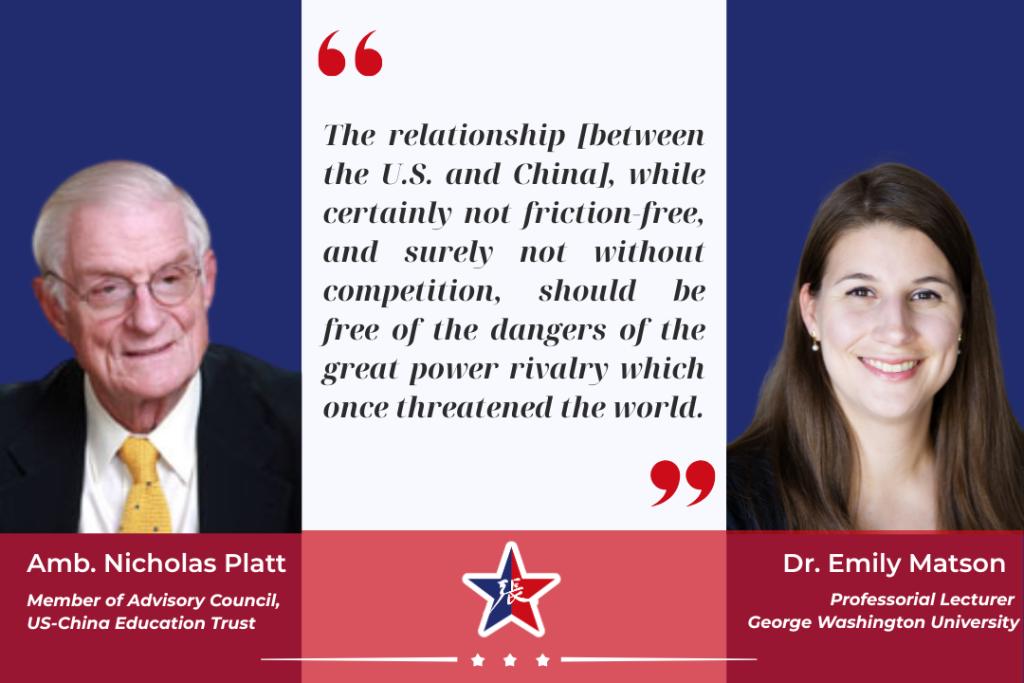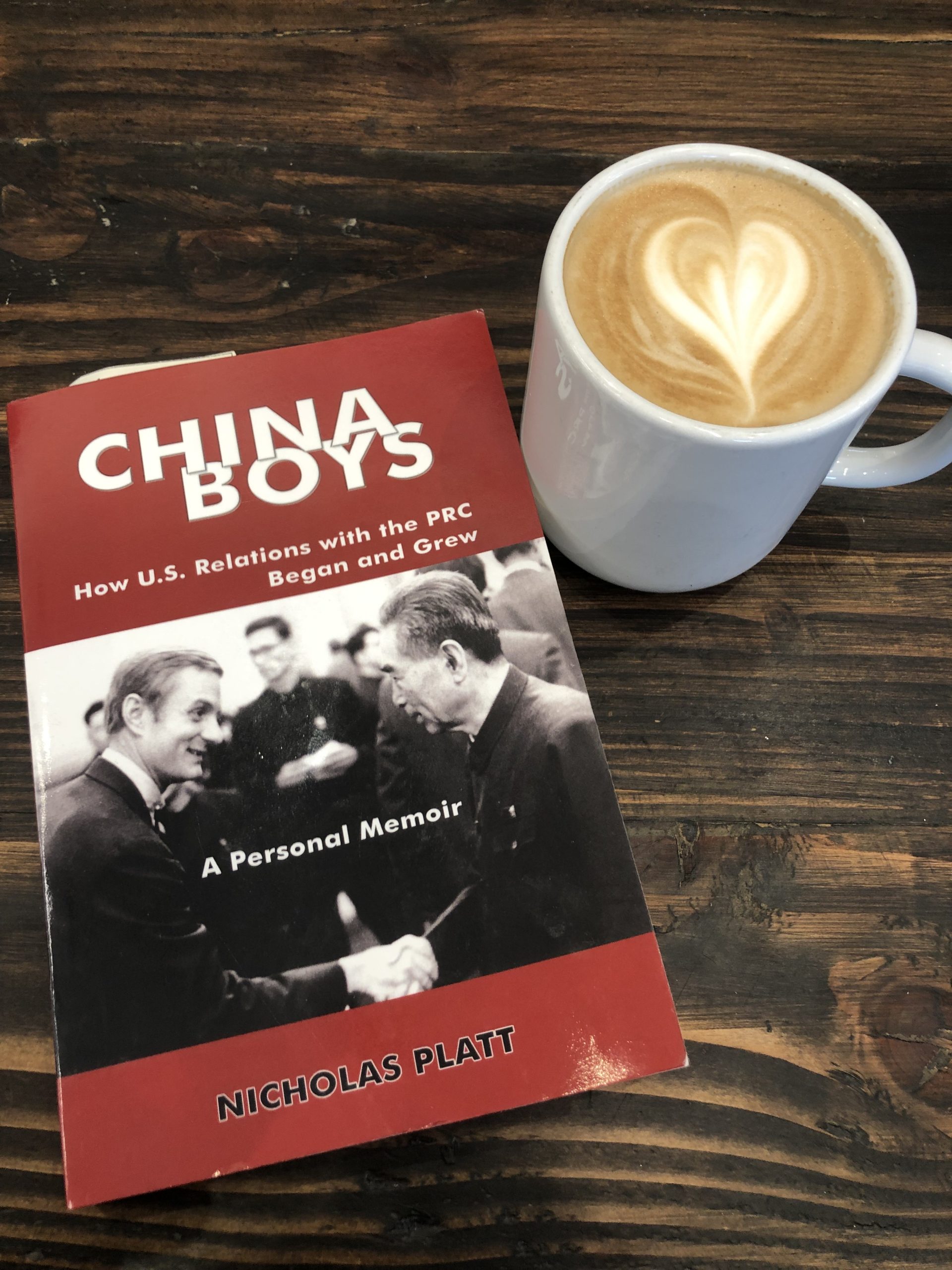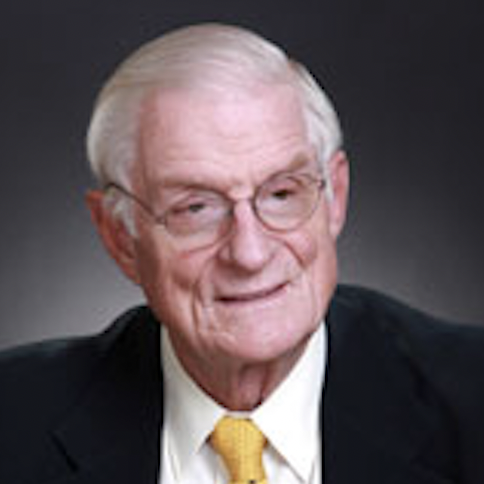
“We want the economies, political systems, and societies [of our two countries] to become so closely connected that conflict and confrontation are no longer even thinkable, much less doable. The relationship, while certainly not friction-free, and surely not without competition, should be free of the dangers of the great power rivalry which once threatened the world.”
—Ambassador Nicholas Platt
Earlier this spring, Dr. Emily Matson, Adjunct Professor of Modern Chinese History at Georgetown University, had an interview with Ambassador Nicholas Platt, distinguished American diplomat and current member of USCET’s Advisory Council. Drawing from their in-person conversation and Amb. Platt’s memoir, China Boys, Dr. Matson shares her reflections on his extraordinary diplomatic journey and enduring vision for U.S.-China relations. Her insights below capture not only the wisdom of a seasoned statesman, but also the timeless value of people-to-people connections.
Written by Emily Matson
When I was in New York City in late March, I had the privilege of meeting in person with Ambassador Nicholas Platt to chat about his experiences strengthening the “nuts and bolts” of Sino-U.S. relations during his 35-year career in the State Department. My husband had obtained a copy of Amb. Platt’s memoir, China Boys: How U.S. Relations with the PRC Began and Grew, and we both read it with great interest. I was particularly intrigued by Ambassador Platt’s time spent in the People’s Republic of China (PRC) during the pivotal years of 1972 and 1973, which set the groundwork for the normalization of Sino-U.S. relations in 1979.
Amb. Platt’s final phase of his formal Mandarin Chinese language training through the State Department’s Foreign Service Institute was spent living in Taiwan in 1963. While there, he and his late wife, Sheila, had the opportunity to meet the Generalissimo (or “the G.”) and Madame Chiang Kai-shek at a garden party. Later, he and Sheila would come to greatly value the encounter, as it made them one of the few couples in their generation to meet leaders on both sides of the Taiwan Straits. Amb. Platt never met Mao, but he did meet both Zhou Enlai and Madame Mao.

I could almost feel Amb. Platt’s excitement as I read through his account of traveling to the PRC for the first time after having studied China for so many years. They first landed in Shanghai “under overcast February skies…over stretches of snow-dusted paddies and villages interlaced with canals, up which floated junks with tall flat sails” (85). The “distinctive field smell” wafting from the surrounding farms was also familiar to Amb. Platt from his time in Taiwan. After landing in Beijing, Amb. Platt was able to witness from a distance President Nixon’s historic handshake with Zhou Enlai. After arrival at the official guesthouse compound, he had a delicious lunch with “the best food and service of any Chinese restaurant anywhere in the world. This visit was going to be fattening,” he remarked (86).
In 1973, Amb. Platt was assigned to the new US Liaison Office in Beijing. While living there, he went everywhere on his bike through the capital city, which was “dusty and down-at-the-heels, for all its ancient and well-kept splendors” (115). What really struck Amb. Platt, though, was the beauty of the local language: “Having been educated that the Beijing dialect is the purest of all Chinese, I was still surprised to find every urchin in the street sounding like a grand concubine. Even insults were elegant” (115). He was there for a year with Sheila and their three sons, the “Three Tigers” (Dahu, Erhu, and Sanhu.” (His third son, Sanhu, even went by this nickname at school!)
During these early years of US-PRC relations, Amb. Platt told me he was particularly proud of the efforts made to strengthen people-to-people relations, the tendons and the sinews that comprise the relations between our two countries. As he mentioned in a 2008 keynote speech he gave at Fudan University, we “want the economies, political systems, and societies to become so closely connected that conflict and confrontation are no longer even thinkable, much less doable. The relationship, while certainly not friction-free, and surely not without competition, should be free of the dangers of the great power rivalry which once threatened the world” (344).
In the end, top-level diplomatic relations are important, but so are people-to-people relations – the intangible cultural, social, and economic ties that bind countries together. When we talk about US-China ties, we must pay attention to these “nuts and bolts” of the relationship. I asked Amb. Platt what recommendations he would give to those of us invested in maintaining and improving US-China relations today. There is nothing to substitute visiting China in person, he said. For those of you who can, “go and visit, and learn as much as you can.” The relationship between our two countries will continue to be important not only for the United States and China, but for the world, and we need to manage it from a basis of knowledge.
Thank you, Ambassador Platt, for your tireless efforts as a “China boy” in improving relations between the United States and the PRC!
See here for Dr. Matson’s full reflection on her conversation with Ambassador Platt:
Bios

Dr. Emily M. Matson is a Professorial Lecturer at the George Washington University’s Elliott School of International Affairs and an Adjunct Lecturer in Georgetown University’s Department of History. She is a member of the third fellowship cohort of the Penn Project on the Future of U.S.-China Relations and a Stephen M. Kellen Term Member of the Council on Foreign Relations, where she previously served as an Education Ambassador.
A passionate historian and educator, Dr. Matson has designed and taught a range of courses in modern East Asian history at Georgetown University, American University, the College of William and Mary, and Randolph College. She remains actively involved as a Research Affiliate at the University of Virginia’s East Asia Center and is a former China Fellow (2021–22) at the Wilson Center.
Her research interests include Northeastern China (东北), historical memory, museums, and World War II. She is currently working on the manuscript of her first book. Dr. Matson earned her Ph.D. and M.A. from the University of Virginia and her B.A. from the College of William and Mary.

Ambassador Nicholas Platt is a former U.S. ambassador to Zambia (1982–84), the Philippines (1987–91), and Pakistan (1991–92), and has spent his career deeply engaged in U.S.-Asia relations. He held key diplomatic postings in Canada, Hong Kong, Japan, and China, including as one of the first members of the U.S. Liaison Office in Beijing following President Nixon’s historic 1972 trip, which he joined as a China specialist.
In Washington, Ambassador Platt served in a range of senior roles, including as director of Japanese affairs, staff member on the National Security Council for Asian affairs, deputy assistant secretary of defense for East Asia, and executive secretary of the Department of State. Following his government service, he led the Asia Society as president for twelve years and now serves as President Emeritus.
Ambassador Platt studied Chinese in Taiwan in the early 1960s and holds degrees from Harvard College and the Johns Hopkins School of Advanced International Studies (SAIS). He is the author of China Boys: How U.S. Relations with the PRC Began and Grew, and continues to serve on several nonprofit boards focused on U.S.-Asia engagement.
